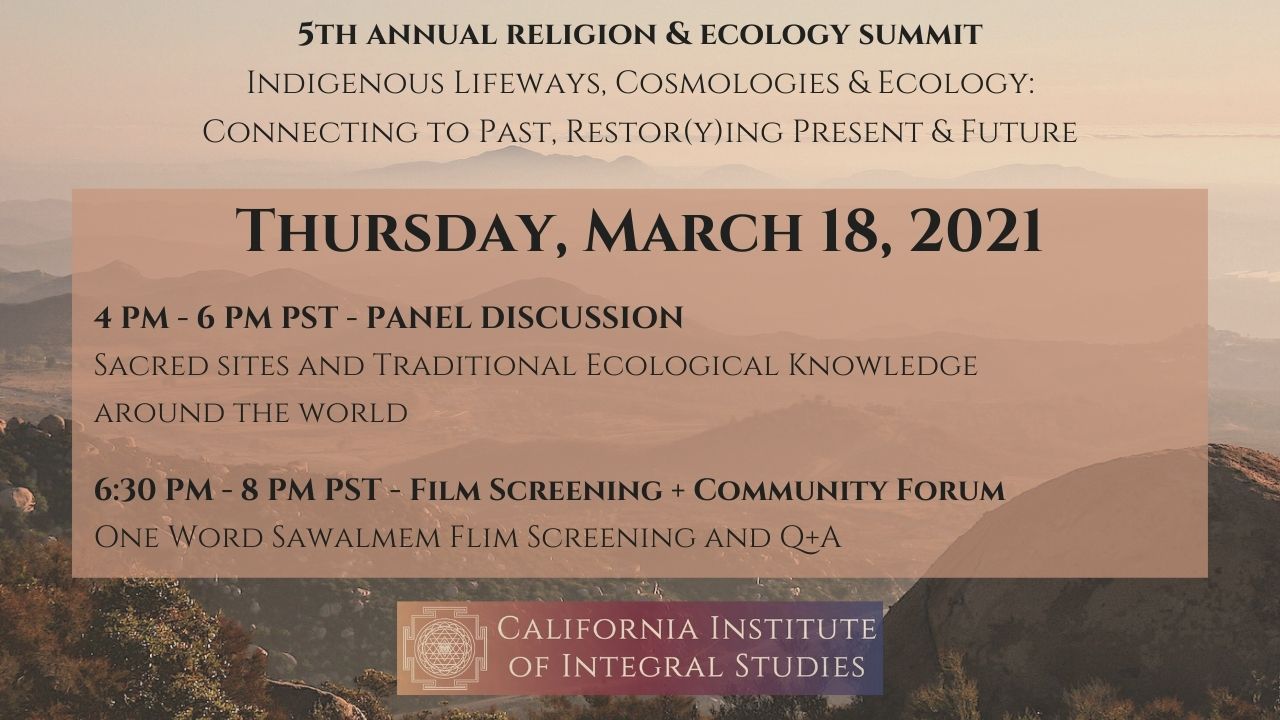Panel Title
Sacred Sites and Traditional Ecological Knowledge Around the World
Loading...
Presenter Bio
Chair of Ecology, Spirituality, and Religion and Associate Professor of Ecology and Religion at the California Institute of Integral Studies
Elizabeth Allison, PhD, is an environmental social scientist studying the intersection of religion and ecology. Dr. Allison studies the convergence of religion and ethics with environmental policy and practice through researching traditional ecological knowledge in mountain regions, particularly as it relates to biodiversity, waste, ecological place, and climate change. She is Associate Professor of Ecology and Religion at the California Institute of Integral Studies in San Francisco, where she founded and chairs the graduate program in Ecology, Spirituality, and Religion and created the Religion & Ecology Summit series of annual conferences. Dr. Allison is co-editor of After the Death of Nature: Carolyn Merchant and the Future of Human-Nature Relations (2019). She is currently writing a book about religion, the environment and development in the modernizing of Bhutan, as well as co-leading a research project on the melting of glaciers with the Institute of Research for Development in France. Dr. Allison earned her PhD in environmental science, policy and management from the University of California Berkeley. She was a Fulbright Scholar in Nepal. She also holds a master’s degree in environmental management from the Yale University School of Forestry & Environmental Studies and a master’s degree in religion from the Yale Divinity School.
Presentation Description
As throughout the Himalayas, protector deities and local spirits are perceived to inhabit various features of the landscape in Bhutan, causing these places to be treated with reverence and respect. Vajrayana Buddhism and local spiritual beliefs are central to the cultural identity of the Kingdom, informing into government planning documents, town planning negotiations, and the 2008 Constitution. This elevation of local spiritual belief has been central to the maintenance and preservation of Bhutanese culture in its encounter with globally hegemonic social, economic, and political norms. Grounding spiritual beliefs in specific sites of the landscape, protector deity abodes, or citadels, sanctify the landscape, creating nodes of resistance and resilience in Bhutan, even as the pressures of global integration seek to impose hegemonic Western norms.
Link to Website(s)
Dr. Allison with Ecology, Spirituality, and Religion at CIIS
Presenter Photo

Sacred Natural Sites as Nodes of Resistance and Resilience
As throughout the Himalayas, protector deities and local spirits are perceived to inhabit various features of the landscape in Bhutan, causing these places to be treated with reverence and respect. Vajrayana Buddhism and local spiritual beliefs are central to the cultural identity of the Kingdom, informing into government planning documents, town planning negotiations, and the 2008 Constitution. This elevation of local spiritual belief has been central to the maintenance and preservation of Bhutanese culture in its encounter with globally hegemonic social, economic, and political norms. Grounding spiritual beliefs in specific sites of the landscape, protector deity abodes, or citadels, sanctify the landscape, creating nodes of resistance and resilience in Bhutan, even as the pressures of global integration seek to impose hegemonic Western norms.
https://digitalcommons.ciis.edu/religionecologysummit/2021/Thursday/1



